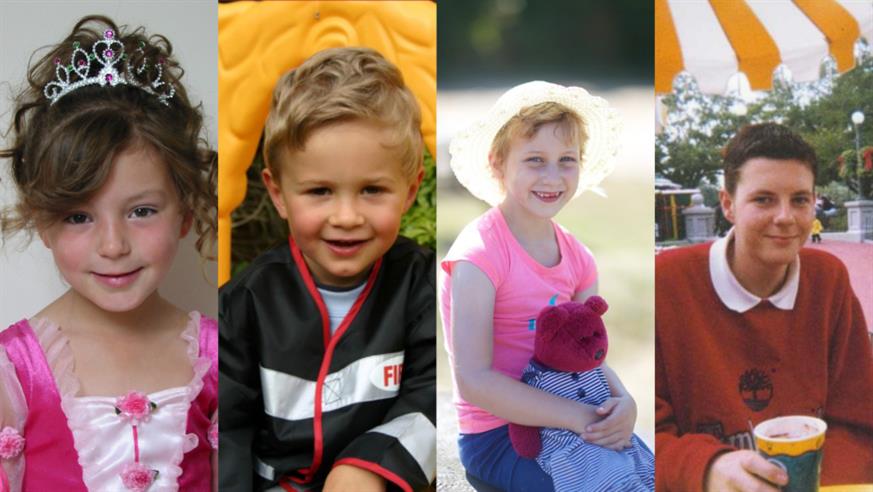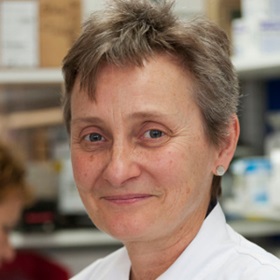
Every day, scientists from The Institute of Cancer Research, London, are working hard to improve the outlook for children with cancer.
Through vital research, we’ve started to make huge advances in understanding the biology and genetics of children’s tumours, and translated this research into diagnostic tests that can help children access targeted treatments and new drugs designed specifically for children’s cancers.
None of these discoveries would have been possible without the support of parent-led charities who, motivated by tragedy, want to make sure no other children or parents have to go through what their families suffered.
Our research into childhood cancers is transforming how these rare but devastating diseases are treated, as well as pioneering studies of cancer types not studied elsewhere in the UK.
Making a difference in DIPG
Amanda and Ray Mifsud lost their six-year-old daughter Abbie to a DIPG brain cancer in 2011. Together they set up Abbie’s Army in November 2012 so that one day parents of children diagnosed with DIPG will not be told that there is no cure and no hope, as they were. Amanda said:
“We could never have imagined losing our beautiful daughter in the way we did…it was the cruellest way possible to DIPG brain cancer. Knowing she had no treatment available because quite simply there were none to give her, for us was a very compelling case for us to fund research.
“Over the time that we have been involved with ICR the progress really has been relentless and continuous in extending knowledge of these tumours.”
Abbie’s Army’s first funding award was to a PhD student in Professor Chris Jones’ lab at the ICR, Kathryn Taylor.
“Kathryn dedicated her thesis to Abbie which moved me beyond words. Not only that her work was part of a very influential and meaningful discovery of mutations in the ACVR1 gene in a subset of DIPG patients – inhibitors for which are now being developed further for new upcoming clinical trials. Knowing she was so touched and inspired by our story to continue her work in the US determined to find an answer, not just for us but other families too…it just means such a lot that even though Abbie cannot be here she has an impact on others."
Elin’s legacy for Ewing sarcoma
Elin Rose was diagnosed with Ewing Sarcoma, a rare bone cancer, in 2013. Her parents Sian and Martin Waite fundraised for her in the US, which gave them precious extra time with their daughter. Although Elin succumbed to the disease in 2015, they’re continuing to raise funds for research into Ewing sarcoma.
“Why? Because who else will?” explains Martin.
“Without research there will be no cure. Supporting research as private individuals is important because there is little support at governmental level. The more niche the illness the less likely there is to be any funding or drive from any given government.”
The Elin Rose Appeal has funded the work of PhD student Antonio Romo-Morales in Professor Janet Shipley’s lab since 2016.
“We have visited the labs on a few occasions and we have always been impressed by the care and diligence of the work, the drive and passion of the staff and welcome we always receive. All of these moments are memorable and we feel a sense of great pride in what researchers have been able to achieve in our daughter's name. Our most recent visit showed some promising results and we were deeply proud of the work Antonio presented.
“I think that is what defines the ICR and sets it apart for us – the drive and passion that seems to fill everything they do. Being a very small and extremely peripheral part of that fills us with immense pride also. I speak at schools and events about the work the ICR does and I can't help but show the same level of excitement as Antonio and Janet and all the others do when they are talking about the work. This includes the Discovery Club events for donors, during which the excitement is infectious and the over-riding feeling is that these are good people doing good work that will do, deep and lasting good.”
Genetic test for children with cancer
Kevin and Karen Capel set up the charity Christopher's Smile in 2008, just a few months after the loss of their young son to medulloblastoma. Kevin and Karen’s incredible efforts, in Christopher’s memory, have been improving the outlook for children with cancer ever since. Kevin said:
“Without research into diseases such as childhood cancers, children will still be dying from these aggressive cancers in years to come, suffering not only from the disease but from the harsh side effects of the available treatments that have been used now for decades, treatments which leave their own legacy of issues, aside from the cancers themselves.
“Having seen first-hand the side effects of the “older” treatments, we felt there was a need to move forward to something with more effective and kinder treatments, and the only way to change the status quo is through research.
“The ICR is also well respected in the research world and it is important to us to ensure our funds are put to the best possible use in terms of projects which result in making a difference for patients in the clinic.”
Kevin and Karen have raised more than £1 million for childhood cancer research at the ICR, providing funding for four dedicated research scientists. Their support has led to the development of a new genetic test for children with cancer – helping clinicians to choose the best possible treatment regimens for each child.
“Our proudest moment working with the ICR has been the introduction of a genetic sequencing panel specifically for children into NHS England test directory. The panel was developed by the ICR, funded by Christopher’s Smile, and the result means that children with solid tumours may now be sequenced at diagnosis and relapse across England.”
Find out more about our latest childhood cancer discovers, the families we work with, and how you can support our research.
£1.5 million for rhabdomyosarcoma
Lynn and Lynn Lucas set up the Chris Lucas Trust after their son’s tragic death from rhabdomyosarcoma – a cancer that resembles muscle tissue – in July 2000. Lynn said:
“We desperately need a cure for rhabdomyosarcoma. We need to specifically target the areas affected in the body from rhabdomyosarcoma to enable the patient to have better outcomes. Better quality of life. The only way to find better outcomes and ultimately find a cure is by cancer research.”
The Lucases have so far raised over £1.5 million for research into rhabdomyosarcoma at the ICR and continue to fundraise through flagship events such as the Great North Bike Ride. Some of the research findings funded by the Trust are being incorporated into a brand new international clinical trial for rhabdomyosarcoma patients in the UK and other countries, which is planned to open this year.
“We were at the ICR Discovery Club event in London and thanked by the ICR for our fundraising dedication. At the event we were approached by a parent of a child that suffered from rhabdomyosarcoma she thanked us and said if we had not conducted our research many years ago her child would not be alive today. We were really touched by her sentiment.”
Incredibly grateful
At the ICR, we are incredibly grateful for the tireless work and dedication of these parents, and many others like them, who have harnessed their grief and turned it into something positive – that has already begun to change the lives of children with cancer.
Children’s Cancer Awareness Month gives us a chance to highlight the incredible research that goes on at the ICR, but we continue to work tirelessly with our parent charity partners all year round to keep making the discoveries that we hope will one day defeat children’s cancer.
